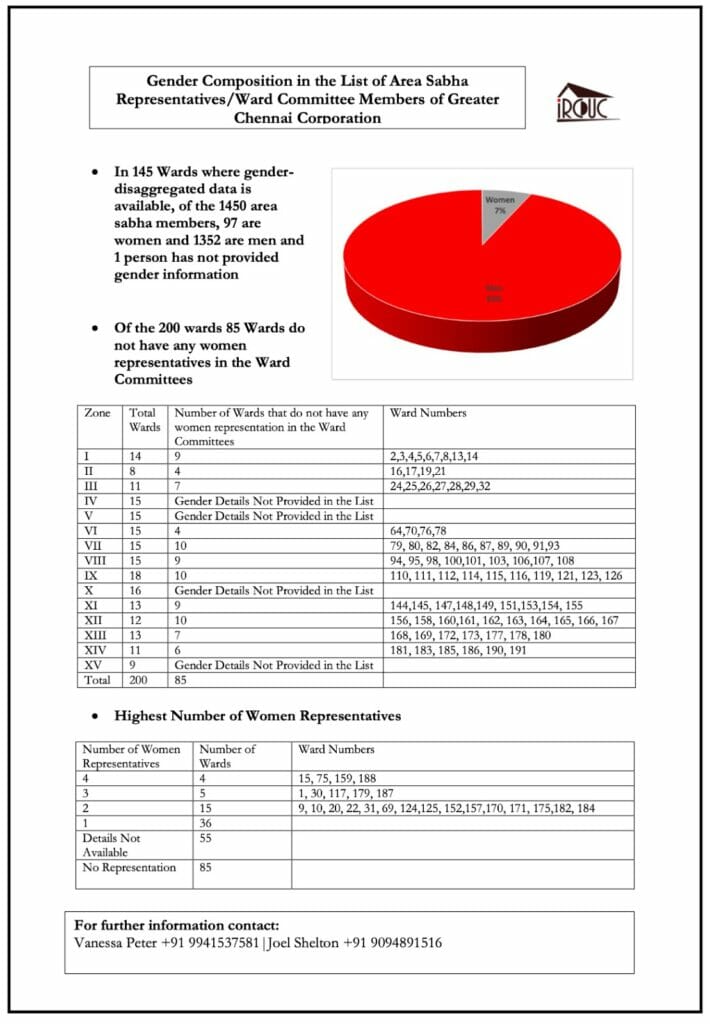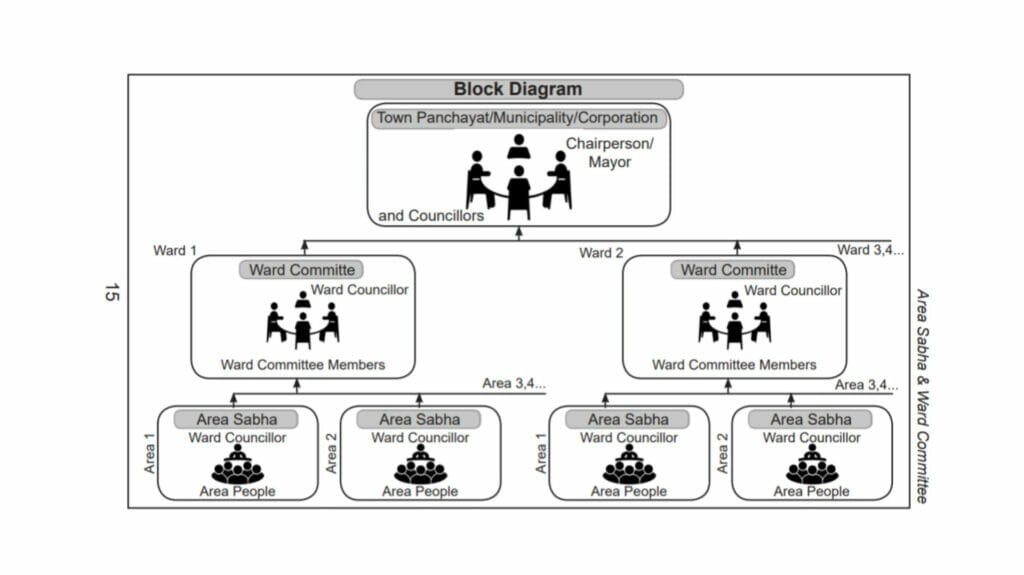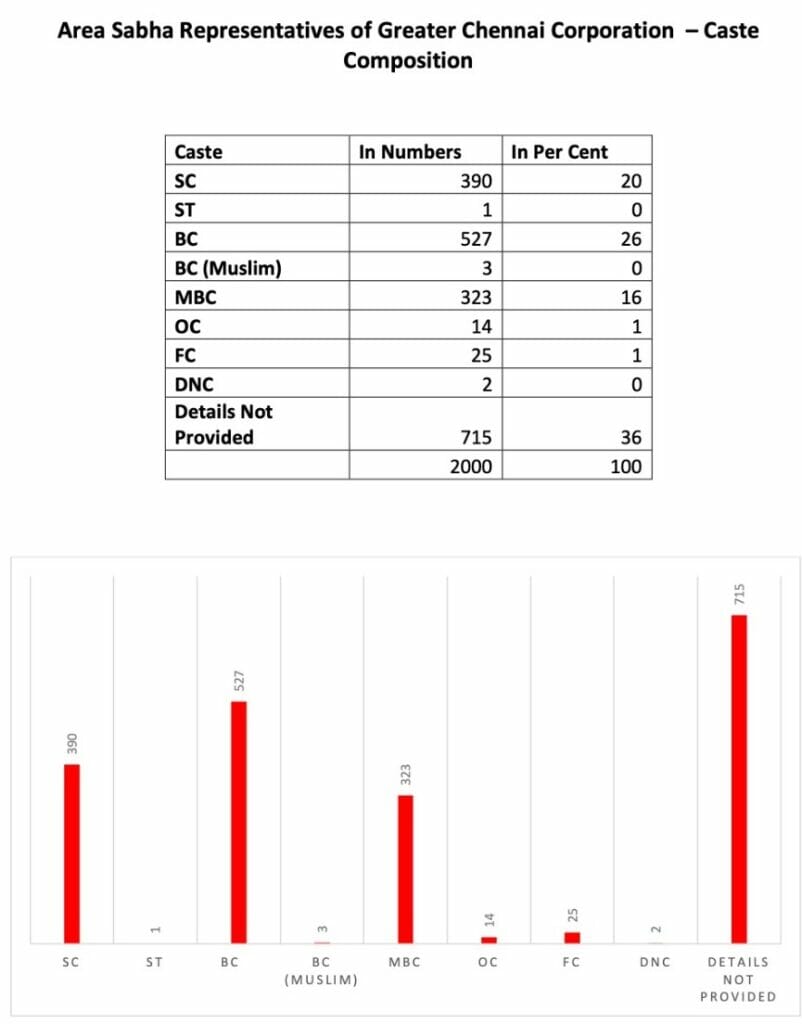“If I had been made a Ward Committee member, I would have pushed for relocation of the wine shop near my lane so that women can walk around safely after sunset,” says Mallika, a daily wage worker from Nesapakkam, Ward 137 of the Greater Chennai Corporation.
Unfortunately, she was unaware of when the councillor of her ward chose the Area Sabha Representatives or who the Ward Committee Member of her area was. “The councillor came during the local body election time. I do not recollect seeing him coming after that,” she says.
While it has been touted as a platform for participatory democracy at the grassroots level, there are many Chennaiites who have found a lack of information on how Ward Committees have been constituted and how to engage with them.
Who forms the Ward Committee and Area Sabhas?
The first step in the formation of Ward Committees is the delimitation of wards into areas. Every ward has been delimited to form 10 areas. Each area will have the urban equivalent of a Gram Sabha, called the Area Sabha, where every voter is an Area Sabha Member. The Ward Councillor is the chairman of the Area Sabha, and the aim of the meetings of the Area Sabhas is to discuss development projects and other civic issues in the area.
A person from each Area Sabha will be nominated by their Ward Councillor as an Area Sabha Representative to represent their respective areas in Ward Committees. There they will hold the title of Ward Committee Member. The Councillor is the Chairman of the Ward Committee.
“They will have a focussed discussion with the 10 Area Sabha Representatives in the Ward Committee,” says Charu Govindan, the Founder-Member and Coordinator at Voice of People, a non-partisan, voluntary civil society organisation, working towards a people-participatory democracy.
The willingness of the Ward Committee member nominees is registered through the submission of Form-1. A list of eligible nominees for Ward Committees is then prepared and placed before the council for confirmation.
During the Council Meeting that was held on 30th January 2022, the resolution to hold Area Sabhas was passed. A list of Ward Committee Members was also published.
GCC has shared the list of the 2000 Ward Committee members for its 200 wards on its website. Area maps are also available on the website.
Selection of Ward Committee Members in Chennai
“When I spoke to some Councillors about how they selected their Ward Committee Members, they said that their political parties had influence over the nomination,” says Charu. “Sometimes the alliance party members also made it to the Area Sabha Representative list. I spoke to Councillors from almost every political party in Chennai.”
Some residents who are involved in civic activities wanted to be enrolled as Ward Committee Members, but not everyone could become one. “I wanted to get nominated as an Area Sabha Representative. But we were completely kept in the dark about the proceedings, although we were in touch with our ward officials,” says Raghukumar Choodamani, a resident of Ward 71 in Permabur. “The representative of my area is a person associated with DMK”, he adds.
Ananthi from Ward 143 and Vasanthi Kannan from Ward 132 also wanted to become Area Sabha Representatives, but they were not informed about the process to be nominated by their Ward Councillors.
A different approach
However, not all Councillors nominated party members to be Area Sabha Representatives. “A Councillor in South Chennai fought with her party that five of the ten representatives must be non-partisan citizens,” says Charu on her conversations with the Councillors.
“Another Councillor from North Chennai told that she wished to include opposition party members if the Area Sabha Representatives preferred that,” says Charu.
V Anandam, Councillor of Ward 176, says that he reached out to people who are civic activists to become Ward Committee Members.
B Vimala, Councillor of Ward 41 B and Fathima Ahamath, Councillor of Ward 61 also claim to have followed a similar approach to pick Ward Committee Members for their respective wards.
“If the Committee consists of people favoured by the Councillor and their party, then how can we make them accountable? People’s grievances from the Area Sabhas may not be taken up by such Committees,” says Charu. “But it is in the hands of the public to come back to the Area Sabhas and hold them accountable and follow up on civic developments. The Councillors have to come back to the people after their tenure for votes again.”
Read more: Councillor Talk: V Anandam wants to improve parks and waste management in Ward 176 – Velachery
Women do not find much representation in Ward Committees
The composition of many ward committees across Chennai is skewed.
Of the 200 wards in Chennai, there were no women Ward Committee Members in 85 wards.
“We did not say no to women to become Ward Committee members. Many women did not come forward for this position,” says Anandam, whose ward has one woman Area Sabha Representative.

“We were asked to submit the list of nominees for Area Sabha Representatives within two days. We could only choose whoever showed interest and was active in their area,” says Fathima about the lack of time provided in selecting the Ward Committee Members.
But when Ananthi of Ward 143 and Vasanthi of Ward 132 expressed their interest to become Ward Committee Members to their respective Councillors, they were informed that the names of other members have already been shared.
Vasanthi has been a civic activist for more than three decades and is also the secretary of the Kodambakkam Residents and Civic Welfare Association. Ananthi is the founder of Bodhi Charitable Trust, an NGO working towards educating children. Currently, men represent their areas.
Councillors Vimala and Fathima also echo similar thoughts as Anandam, adding that many women had financial and familial responsibilities. “They were also not very willing to take up this honourary position which does not pay,” says Vimala.
“They cannot simply give the excuse that women did not participate”, says Vanessa Peter, Founder of the Information and Resource Centre for Deprived Urban Communities (IRCDUC), a Chennai-based NGO. “The government needs to create enabling environment for women to become Area Sabha Representatives. Women from vulnerable communities must also be given priority.”
Read more: Councillor talk: Improving roads the aim for Fathima Ahamath of Ward 61 – Egmore
Caste composition of Ward Committees
IRCDUC also looked at the caste representation of Ward Committee Members.
There is only one Ward Committee member belonging to Scheduled Tribe and two from Denotified Communities. Marginalised communities not seeing adequate representation at this level is a cause for concern and raises questions about how democratic the platforms can be.
“The Ward Committee Members list also did not have representation of trans persons, persons with disabilities and elders,” says Vanessa.
Reservation the need of the hour
“Tamil Nadu is the only state that does not have reservations for the Area Sabha Representatives. If the State Government has mandated the reservation for women and other minority groups, the Councillors would have abided by it,” says Charu.
If Tamil Nadu has a 50% reservation for women in the elected council, this should be mirrored in Ward Committees also say civic activists.
Though the Model Nagar Raj Bill recommends reservation, the decision is ultimately left to the respective State Governments.
“Ward Committees in Karnataka and Kerala have reservations,” says Charu. “It will be a balanced committee when there is reservation for women, those from marginalised communities, trans persons and differently-abled persons.”
Lessons from Bengaluru’s Ward Committees
“Even though there are party members, there are citizens also participating in Ward Committees,” says Vidya Goggi, Core Team member of Bengaluru Ward Samiti Balaga, who is also an Area Sabha Representative.
“We are planning to train the new set of corporators [councillors], ward officials and active citizens about the workings of the Committee,” says Vidya.
The civic body election is slated to happen this year. Even BBMP’s (Bruhat Bengaluru Mahanagara Palike, the civic body in Bengaluru) Commissioner and Deputy Commissioners are on board for training the elected representatives of the city.
“We are holding meetings and discussing the learnings from various wards in Bengaluru with active citizens. Once people are empowered with knowledge about these systems, there will be greater preparedness and participation from the public in local governance,” says Vidya.
Composition of Ward Committees in Bengaluru: 2 RWA representatives + 3 women + 2 people belonging to SC and ST groups + 3 other prominent citizens = 10 members
Many RWA members were not approached or encouraged to become Area Sabha representatives in Chennai. “It is important that RWA members become part of ward committees. They are more aware of the civic issues in their area,” says Vidya.
What is the way ahead now?
“We will wait for the Area Sabhas and Ward Committees to become functional. Six months ago, people were not talking about these platforms. Once they start, there is hope that people will start holding their elected representatives accountable,” says Charu.
Reservation can also be introduced at a later stage, says Srinivas Alavilli, a Bengaluru-based civic activist. “They can simply increase the number of Area Sabha Representatives from 10 to 20. Then the council can include representation of minority communities also.”
What you can do?
- If you want to change your Area Sabha representative: “If 50% or more of the Area Sabha members are not happy with the Ward Committee members, then the Councillor has to change them,” says Charu, noting that the Councillors can change the Ward Committee members in the Council Meeting.
- Attend Area Sabhas and ask how the councillors are going to spend the Ward Development Fund of Rs. 35 lakhs and keep tabs on other civic projects in your area.

